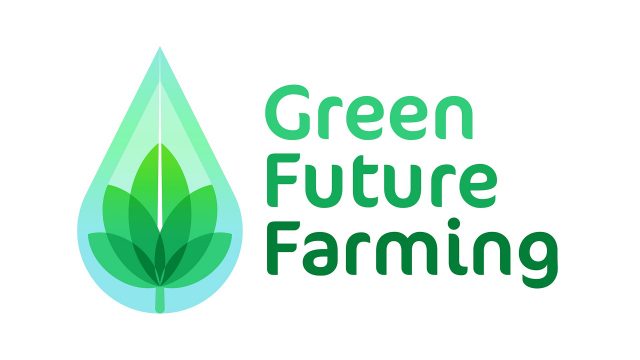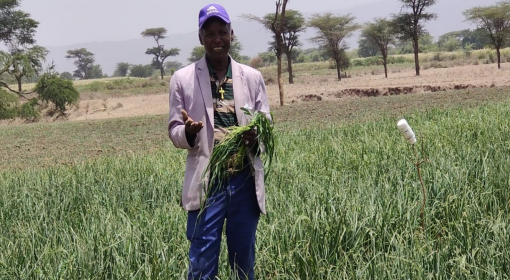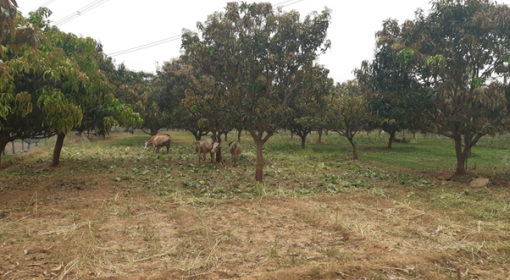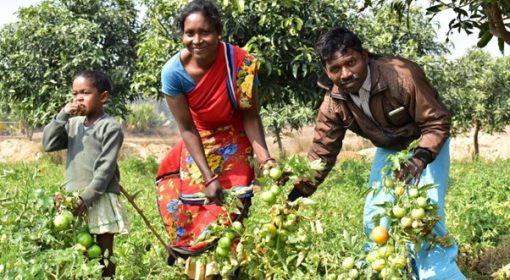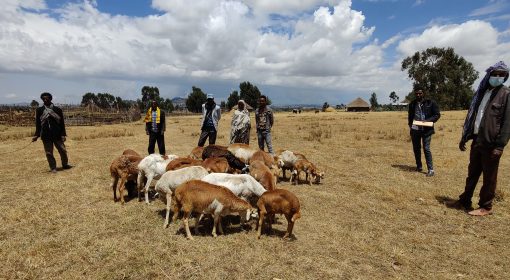
by Jean Marc Pace
June 05, 2020
Why are seeds important?
Every meal ever eaten started off as seeds. Seeds are in fact the genetic resources at the foundation of agricultural systems, whether modernized or traditional. You might still be able to harvest a crop without other inputs such as fertilizer, but there is no crop without seeds! It therefore follows that the quality of seeds and their availability has real implications starting at the farmer and all along the value chain to the consumer.
When we consider Ethiopia, seed quality and availability are two crucial issues.
Seed availability refers to the ability for farmers to access good quality seed in a timely manner and at an affordable price. Seeds in Ethiopia are distributed in a some ways. However, improved seed supply targets are consistently being missed. This has been attributed to inefficiencies in seed production, distribution, and quality assurance systems. Many of these issues can be traced back to flaws in the national seed policy and the limited capacity of local institutions.
Seed quality refers to several characteristics that determine the performance of seeds such as trueness to variety, germination percentage, appearance, age, weight, size, cleanliness, and purity, amongst others. Seeds of high quality will produce a vigorous and uniform crop, with stronger resistance to disease and stress, and a minimal number of seeds which fail to germinate.
Seed quality control and assurance are therefore crucial as acknowledged in Ethiopian Seed Proclamation No. 206/2000 which lays out the legal obligations for anyone engaged in the seed business. This proclamation also legally establishes the National Seed Industry Agency responsible for monitoring and certifying seed quality and assure the competence of actors engaged in the industry. This document was indeed a landmark in Ethiopia agricultural history, but has it had the intended impact?
Where do seeds come from?
The Ethiopian seed systems had undergone many changes and improvements over the past couple of decades, particularly as part of the national Growth and Transformation Plan (GTP). These efforts aim to ensure timely availability of agricultural seed of sufficient quality, and at an affordable price for farmers.
Until recently, the government produced and distributed seeds through a highly centralized system. Under the system, the government would typically supply seed to local agricultural offices, farmers would have to register to purchase seed for the next cropping season and then receive seeds through these offices or local cooperatives.
Of late, Ethiopia has been moving towards more decentralized direct marketing of seeds through Integrated Seed Sector Development (ISSD) for example. The ISSD runs programmes to build the capacity of local seed business while also reviewing seed value chains in Ethiopia. This program opened the market up for seed enterprises, both public and private, by authorizing them to market certified seeds directly to farmers. However, this system is still in infancy and much work is yet to be done to develop profitable and reliable direct seed supply.
In the meantime, seed saving and trading by smallholder farmers and communities is still prevalent. This is the informal seed sector. Despite all the developments of the formal sector, the informal sector is still reported to be the primary source of seed supply in Ethiopia. Somewhere in between the formal and informal sectors is the emerging intermediate sector, this refers to Seed Producer Cooperatives which have features from both other sectors. These cooperatives play an instrumental role in seed availability and supply through high-volume production, variety diversification and seed delivery to farmers including direct marketing. The informal and intermediate seed sector are crucial for ensuring the resilience of smallholder farmers, particularly in times such as these where formal seed supply may be compromised.
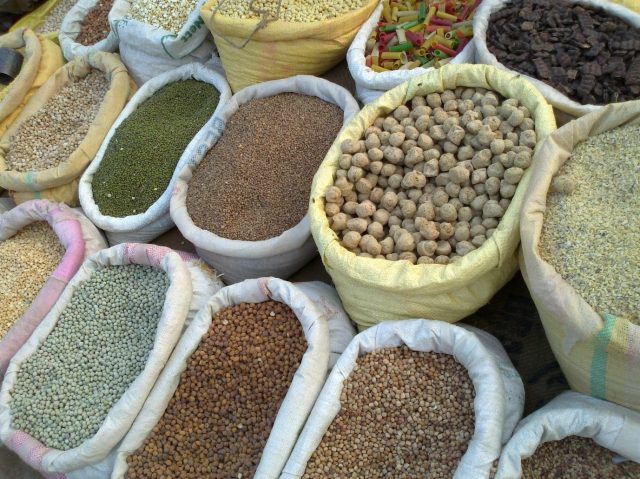
How is the COVID-19 pandemic affecting things?
At the time of writing, the world is going through a global pandemic of the COVID-19 virus, resulting in various measures and restrictions being adopted by states. The ISSD is monitoring the situation in Ethiopia and has identified several key issues impacting seed quality and availability. Challenges in seed processing and distribution are highlighted as being of major concern. The mobility of seed transporters and traders is limited, and work at seed processing facilities has slowed down due to a shortage of labor. The shortage of labor is also raising prices due to increased production costs. Social distancing measures are also hampering the state’s ability to coordinate seed supply and has disrupted regular interactions between key stakeholders – these interactions are an essential part of the decision-making process.
These issues raise concerns that lower quality seed will make its way onto the market, filling the gap left by the current undersupply. The mobility of inspectors and input supervisors is also restricted so this situation may go unaddressed resulting in poor harvests. This can have severe consequences for farmers’ income and food security, especially in this time where food prices are on the increase.
In response to these issues, the government has ordered swift seed distribution and has made some progress with maize, but other staple crop seeds have not seen the same level of success. Farmers have limited options here. They could either find alternative sources of seed – for example seeds saved from previous harvests– or delay planting in hope that seed will eventually be distributed to them.
What does the future hold?
While it is undeniable that progress has been made in making good quality seeds available to Ethiopian farmers, many hurdles remain. Limited capacity of institutions, a lack of clarity in the roles of the various stakeholders in the system, the narrow focus on a few high-value agricultural crops, issues in supply-demand mismatching resulting in shortages and surpluses, and degradation of high quality seed due to inadequate production, storage, and transportation practices and infrastructure. Added to all this, it is currently of the utmost importance that the formal seed sector continues to function while ensuring the safety of its workers, and the mobility of its distributors.
While the emergence and promotion of an intermediate seed sector is definitely a step in the right direction it is important to acknowledge both on the ground, and in policy, that the informal sector is how the majority of farmers get their seeds. The current crisis further highlights the importance of farmer and community level seed production, saving, and exchange to ensure food security and resilience of Ethiopia’s rural population.
A pathway that therefore stands out as a sustainable route to decentralized seed access for farmers is to empower rural communities with the capacity to produce, store and distribute high quality seeds. This can be a great opportunity to synergistically address the seed availability issues while generating rural jobs and contributing positively to food security. With some training and capital investment, unemployed rural youth can secure a livelihood for themselves in small to medium scale seed multiplication enterprises. The benefits from such initiatives will be felt by them, their families and communities. They will also be felt in the form of reduced burden on the formal system which is struggling to meet the seed demands from farmers across the country.
Recommended Reading:
- https://www.accesstoseeds.org/index/eastern-southern-africa/country-profile/ethiopia/
- https://issdethiopiablog.files.wordpress.com/2020/05/covid-19-seed-alert01-ethiopia.pdf
- Benson, T., Spielman, D., & Kasa, L. (2014). Direct seed marketing program in Ethiopia in 2013: An operational evaluation to guide seed-sector reform (Vol. 1350). Intl Food Policy Res Inst.
- Sisay, D. T., Verhees, F. J., & van Trijp, H. C. (2017). Seed producer cooperatives in the Ethiopian seed sector and their role in seed supply improvement: A review. Journal of crop improvement, 31(3), 323-355.
- Kusse, K., & Kassu, K. (2019). Access, Supply System and Utilization of Improved Seed Varieties in Debub Omo Zone, SNNPR. Ethiopia. J Agri Sci Food Res, 10(258), 2.
